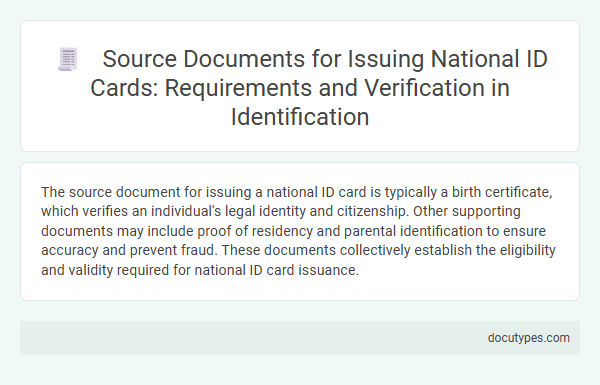The source document for issuing a national ID card is typically a birth certificate, which verifies an individual's legal identity and citizenship. Other supporting documents may include proof of residency and parental identification to ensure accuracy and prevent fraud. These documents collectively establish the eligibility and validity required for national ID card issuance.
Introduction to Source Documents for National ID Issuance
Source documents serve as the foundational proof for issuing a National ID card, verifying the identity and eligibility of applicants. These documents typically include birth certificates, passports, or other government-issued identification proving citizenship or residency. Accurate source documents ensure the integrity and authenticity of the National ID issuance process.
Types of Acceptable Source Documents
The source document for issuing a national ID card serves as the fundamental proof of your identity and citizenship. These documents must be official and recognized by government authorities to validate your eligibility.
- Birth Certificate - An official record issued at birth that confirms your name, date of birth, and parentage.
- Passport - A government-issued travel document that verifies citizenship and identity internationally.
- Driver's License - A state-issued photo ID that demonstrates identity and residency status.
Mandatory versus Optional Documentation
The source document for issuing a national ID card typically includes mandatory documents such as a birth certificate or passport, which verify your identity and citizenship. Optional documentation may include proof of residence or other government-issued IDs that support the application process but are not strictly required. Ensuring you have the correct mandatory documents simplifies obtaining your national ID card efficiently.
Verification Process for Submitted Documents
The source document for issuing a national ID card is the original, government-issued proof of identity such as a birth certificate or passport. A thorough verification process for submitted documents ensures their authenticity before the ID card is issued.
- Document Authenticity Check - Submitted documents undergo validation against official government databases to confirm legitimacy and prevent fraud.
- Biometric Data Matching - Your biometric information is cross-referenced with submitted documents to verify identity consistency during the issuance process.
- Physical Document Inspection - Trained officials examine the physical characteristics and security features of documents to detect alterations or forgeries.
Address and Residency Proof Requirements
| Requirement | Description |
|---|---|
| Source Document for National ID Card Issuance | Official documents such as birth certificates, passports, or previous national ID cards serve as primary source documents for identity verification. |
| Address Proof | Valid documents confirming current residency, including utility bills, rental agreements, bank statements, or government correspondence dated within the last 3 months. |
| Residency Proof | Documents demonstrating continuous residence in the jurisdiction, such as lease contracts, voter registration cards, or residency certificates issued by local authorities. |
| Document Authenticity | All submitted documents must be original or certified copies, bearing official stamps or signatures to qualify as acceptable proofs. |
| Additional Supporting Documents | In cases of address discrepancies, supplementary affidavits or endorsements from recognized local officials may be required to establish residency. |
Ensuring Document Authenticity and Validity
The source document for issuing a national ID card is typically a government-issued birth certificate or a legal residency permit. These documents serve as primary proof of identity and citizenship, establishing the individual's eligibility for the national ID.
Ensuring the authenticity and validity of these source documents involves verification against centralized government databases. Advanced security features such as holograms, watermarks, and unique biometric data further prevent forgery and unauthorized duplication.
Handling Lost or Damaged Source Documents
The source document for issuing a National ID card typically includes a birth certificate, passport, or other government-issued identification proving your identity and citizenship. These documents must be verified to ensure the accuracy of the information on the National ID card.
If your source document is lost or damaged, you need to report the issue to the relevant government agency immediately. Replacement procedures often require submitting an affidavit or proof of identity through alternative documents before reissuing the original source document.
Challenges in Source Document Verification
The source document for issuing a national ID card is an official record that verifies an individual's identity, such as a birth certificate or passport. Verification of these documents often faces several challenges that can affect the accuracy and reliability of the identification process.
- Document Authenticity - Ensuring the source document is genuine is difficult due to sophisticated forgery techniques.
- Data Consistency - Variations in personal information across different documents can complicate identity verification.
- Accessibility Issues - Limited access to centralized databases hinders effective verification of source documents.
Overcoming these challenges is essential for maintaining a secure and trustworthy national ID issuance system.
Legal and Regulatory Frameworks
The source document for issuing a National ID card typically stems from the country's legal and regulatory frameworks established by government authorities. These frameworks define eligibility, documentation requirements, and issuance procedures to ensure authenticity and security.
Your proof of identity is verified against official records such as birth certificates, citizenship documents, or biometric data outlined in these regulations. Laws governing the issuance of National ID cards vary but commonly mandate a source document that confirms nationality and personal information. Compliance with these legal standards ensures the integrity of the identification system and protects citizens' rights.
What Is the Source Document for Issuing a National ID Card? Infographic

